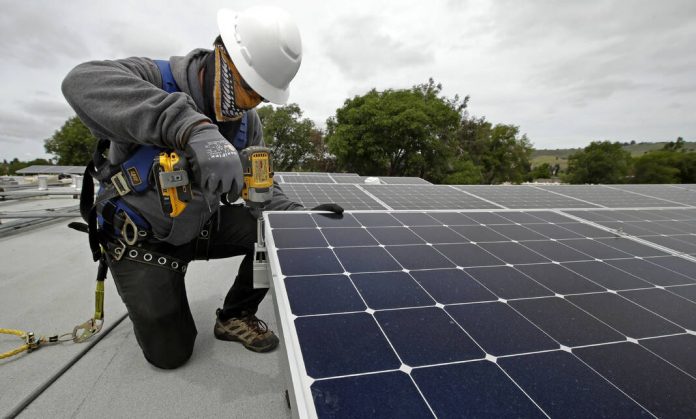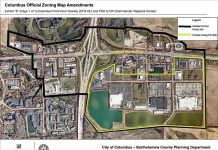The Columbus Plan Commission is continuing to consider regulations for solar farms and these facilities’ potential impact on the city’s future growth.
The commission has “Zoning Ordinance Amendments regarding Commercial Solar Energy Systems (CSES)” scheduled as a discussion item for its meeting on Wednesday, which will be held at 4 p.m. in the council chambers of Columbus City Hall. The conversation is one of the last items on the agenda.
City/County Planning Director Jeff Bergman said that this will be a continuation of last month’s discussion of commercial solar facilities with an emphasis on “city growth outlook.”
According to a previous memo from Bergman, CSES or solar farms are “large-scale facilities that generate electricity for commercial sales.” The classification does not apply to solar panels at individual homes or businesses that primarily provide energy for the property on which they are located.
For the city plan commission’s jurisdiction, solar farms are currently listed as a conditional use in the Agriculture: Preferred zoning district and prohibited elsewhere, he said. At present, the city’s zoning ordinance does not include specific minimum setbacks or other development standards for these systems.
The Bartholomew County Plan Commission, on the other hand, voted in November to approve an ordinance on CSES with specific regulations.
In light of this, the question at hand is whether the city commission would like to adopt standards of its own and, if so, how similar these should be to the county’s ordinance, said Bergman.
“I will tell you that the most likely scenario for the city is that these kind of facilities will be in the two-mile jurisdiction, that they may be partially located in the county’s jurisdiction and partially located in the city’s jurisdiction, as we’re thinking about the two-mile area outside of the city limits,” he said at the commission’s June meeting. “I will tell you that we’re aware of two such projects being contemplated in Bartholomew County.”
He described both projects as having a significant or “potentially significant” presence within the city’s jurisdiction.
Indiana law allows city and town plan commissions throughout the state to establish an expanded planning jurisdiction, provided it extends no farther than two miles from each incorporated city or town boundary.
Bergman said that while the county’s ordinance states that solar fields must not be located closer than a half-mile to any municipal boundary line, the city could choose to adopt a different standard.
Columbus City Council liaison Dave Bush said that this is something to consider.
“Part of why we have a two-mile jurisdiction is because we can kind of moderate our growth or plan accordingly for the growth of the city,” he said. “So I think the biggest thing — I think most of what the county’s done is pretty smart. They were very thoughtful about it. I think our consideration on top of that is the growth of the city and how close do we want these facilities to be to city limits. Because there may be, maybe we don’t want them in the two-mile jurisdiction, period. Thirty years is a really long time.”
According to Bergman, solar companies have indicated that a typical lease term is 30 years.





